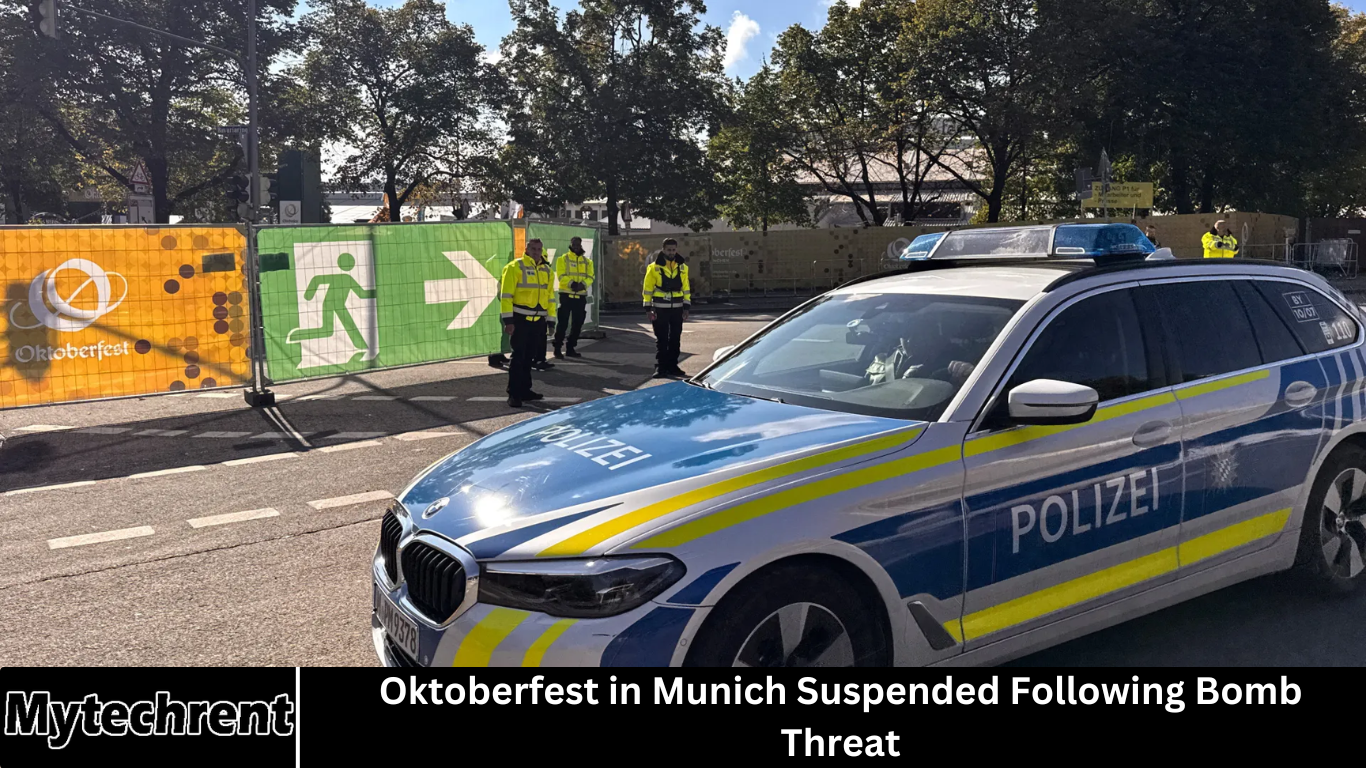Munich, Germany – In a shocking turn of events, the world-famous Oktoberfest in Munich was abruptly suspended due to a bomb threat, raising concerns about public safety and the future of one of the largest folk festivals in the world.
- What Is Oktoberfest?
- Timeline of the Bomb Threat Incident
- How Authorities Responded
- Evacuation and Public Safety Measures
- Economic Impact of the Oktoberfest Suspension
- Reactions from Locals and Tourists
- A Look Back: Previous Security Threats at Oktoberfest
- Oktoberfest Security Protocols: Then and Now
- Will Oktoberfest Resume? Future Outlook
- Frequently Asked Question
- Why was Oktoberfest in Munich suspended?
- Was anyone hurt during the Oktoberfest evacuation?
- Was a bomb actually found at Oktoberfest?
- Will Oktoberfest 2025 resume after the bomb threat?
- How often has Oktoberfest faced security threats?
- What happens to tickets and reservations after the suspension?
- How will this affect future Oktoberfests in Munich?
- Conclusion
The suspension of the festival, which typically attracts over six million visitors annually, has sent ripples through Germany’s tourism industry and raised questions about event security in the modern age.
In this comprehensive report, we’ll delve into the incident, official responses, security protocols, economic implications, public reactions, and what this means for the future of Oktoberfest.
What Is Oktoberfest?
Oktoberfest is the world’s largest beer festival and traveling funfair, held annually in Munich, Bavaria, Germany.
Traditionally starting in late September and running into the first weekend of October, the event is known for its large beer tents, Bavarian music, traditional German clothing (lederhosen and dirndls), and hearty German cuisine.
Started in 1810, Oktoberfest celebrates the wedding of Crown Prince Ludwig (later King Ludwig I) to Princess Therese of Saxony-Hildburghausen. Over two centuries later, it has grown into a global cultural phenomenon, drawing visitors from every corner of the globe.
Timeline of the Bomb Threat Incident
The Day It Happened
The bomb threat that led to the suspension of Oktoberfest occurred on the evening of October 3, 2025, coinciding with Germany’s national holiday, Tag der Deutschen Einheit (Day of German Unity).
According to police reports, a credible tip was received around 6:30 PM local time, warning of an explosive device within the Oktoberfest grounds at Theresienwiese.
Immediate Action
Authorities quickly coordinated with festival organizers to begin a controlled shutdown and evacuation of the festival area. Within 90 minutes, thousands of attendees were escorted out of the grounds in a calm but urgent manner.
How Authorities Responded
Law Enforcement’s Role
The Munich Police Department deployed bomb squads, K9 units, and emergency response teams to sweep the area. Drones and surveillance technology were also used to scan for suspicious items or activities.
Snipers were positioned around the perimeter, and nearby public transportation was temporarily halted.
Government Statement
Bavaria’s Interior Minister issued a public statement:
“We take all threats seriously, especially when public safety is at risk. We will not compromise when it comes to the protection of our citizens and visitors.”
The decision to suspend Oktoberfest was made “out of an abundance of caution,” authorities confirmed.
Evacuation and Public Safety Measures
Efficient Crowd Control
Due to the strict crowd control measures in place, the evacuation of over 100,000 attendees was accomplished without major panic or injury.
The city of Munich had already implemented a robust security strategy, including entry checkpoints, bag checks, and surveillance, which helped manage the situation effectively.
Emergency Alerts
The NINA emergency warning app was used to notify the public of the situation in real time. Social media platforms and news outlets quickly disseminated the information, helping people avoid the area.
Economic Impact of the Oktoberfest Suspension
Immediate Losses
The temporary suspension of Oktoberfest is expected to cause millions of euros in economic losses. Local businesses, breweries, hotels, restaurants, and vendors rely heavily on the annual influx of tourists. On average, Oktoberfest brings in over €1.2 billion to the local economy.
Tourism and Hospitality Hit Hard
-
Hotel cancellations skyrocketed within hours of the incident.
-
Local shops saw reduced foot traffic the following day.
-
International tourists, many of whom had planned trips months in advance, faced uncertainty about refunds and travel changes.
Long-Term Effects
If confidence in event safety isn’t restored, future attendance could decline, impacting the city’s reputation as a safe travel destination.
Reactions from Locals and Tourists
Locals’ Perspective
Many residents of Munich praised the authorities for their swift and organized response. Some, however, expressed concern over the increasing number of threats during large public events.
A local beer tent worker said:
“It’s heartbreaking. We prepare for this all year. But safety has to come first.”
Tourists Speak Out
Tourists shared mixed feelings. While some were grateful for the precaution, others were disappointed.
An Australian tourist commented:
“We traveled 15,000 kilometers for Oktoberfest. It’s a shame, but I understand why it had to be done.”
A Look Back: Previous Security Threats at Oktoberfest
1980 Oktoberfest Bombing
The incident brought back painful memories of the 1980 Oktoberfest bombing, one of the deadliest terror attacks in post-war German history. That bombing killed 13 people and injured over 200, and it remains a dark chapter in the festival’s legacy.
Since then, security has become a critical component of planning for every Oktoberfest.
Oktoberfest Security Protocols: Then and Now
Pre-2000s
In earlier decades, security at Oktoberfest was relatively relaxed. Festivalgoers could enter freely, and the focus was more on celebration than protection.
Post-9/11 Era
Following global terror incidents, security was ramped up significantly:
-
Mandatory bag checks at entrances
-
Heightened police presence
-
Metal detectors and restricted entry points
-
Coordination with international intelligence agencies
Recent Upgrades
In the past few years, Munich authorities have added:
-
AI-powered facial recognition
-
Drone monitoring
-
Real-time crowd density tracking
-
Emergency “panic buttons” for festival staff
Despite these efforts, this latest bomb threat has proven that no system is infallible.
Will Oktoberfest Resume? Future Outlook
Current Status
As of now, Oktoberfest has been suspended indefinitely, pending further investigations. Bomb squads did not find any explosives, but authorities have not ruled out further threats.
Possibility of Reopening
City officials are exploring whether the festival can be reopened safely in the coming days with enhanced security measures.
Future Safeguards
-
Introduction of clear bag policies
-
Increased military and intelligence coordination
-
Real-time communication apps for visitors
-
Improved evacuation drills
There are also calls to limit capacity at the event to better manage crowd safety.
Frequently Asked Question
Why was Oktoberfest in Munich suspended?
Oktoberfest in Munich was suspended due to a credible bomb threat reported to local authorities. As a precautionary measure to ensure public safety, police ordered an immediate evacuation of the Theresienwiese festival grounds while bomb squads conducted a thorough search.
Was anyone hurt during the Oktoberfest evacuation?
No, there were no injuries reported during the evacuation. Thanks to well-planned security measures and calm crowd management, over 100,000 attendees were evacuated safely and efficiently.
Was a bomb actually found at Oktoberfest?
As of the latest reports, no explosive device was found during the investigation. However, the threat was considered credible enough to warrant a full suspension of the event and a comprehensive security sweep of the premises.
Will Oktoberfest 2025 resume after the bomb threat?
Oktoberfest 2025 has been suspended indefinitely while investigations continue. City officials have not yet confirmed whether the festival will resume, but they are reviewing enhanced security measures to potentially reopen the event safely.
How often has Oktoberfest faced security threats?
While Oktoberfest has strong security protocols, major threats are rare. The most serious incident occurred in 1980, when a bombing killed 13 people. Since then, security has been a top priority, with frequent upgrades to surveillance and crowd control systems.
What happens to tickets and reservations after the suspension?
Attendees with prepaid tickets or reservations for tents, hotels, or events are advised to contact organizers or booking agencies. Many businesses are offering refunds or rebooking options, depending on the terms and the duration of the suspension.
How will this affect future Oktoberfests in Munich?
This incident will likely lead to tighter security measures at future Oktoberfests, including enhanced screening, surveillance, and possibly attendance limits. While the threat is being taken seriously, city officials have expressed commitment to preserving the tradition while keeping visitors safe.
Conclusion
The suspension of Munich’s Oktoberfest due to a bomb threat serves as a stark reminder of the world we live in today — one where even the most joyful and traditional gatherings can be threatened by fear and violence.
While no explosive was found and no one was harmed, the emotional, economic, and cultural toll is undeniable. As authorities work to investigate the incident and ensure future safety, the world watches closely.
Oktoberfest is not just a beer festival — it’s a symbol of unity, celebration, and German heritage. Ensuring its security is not just about protecting an event, but preserving a centuries-old tradition that brings joy to millions.








